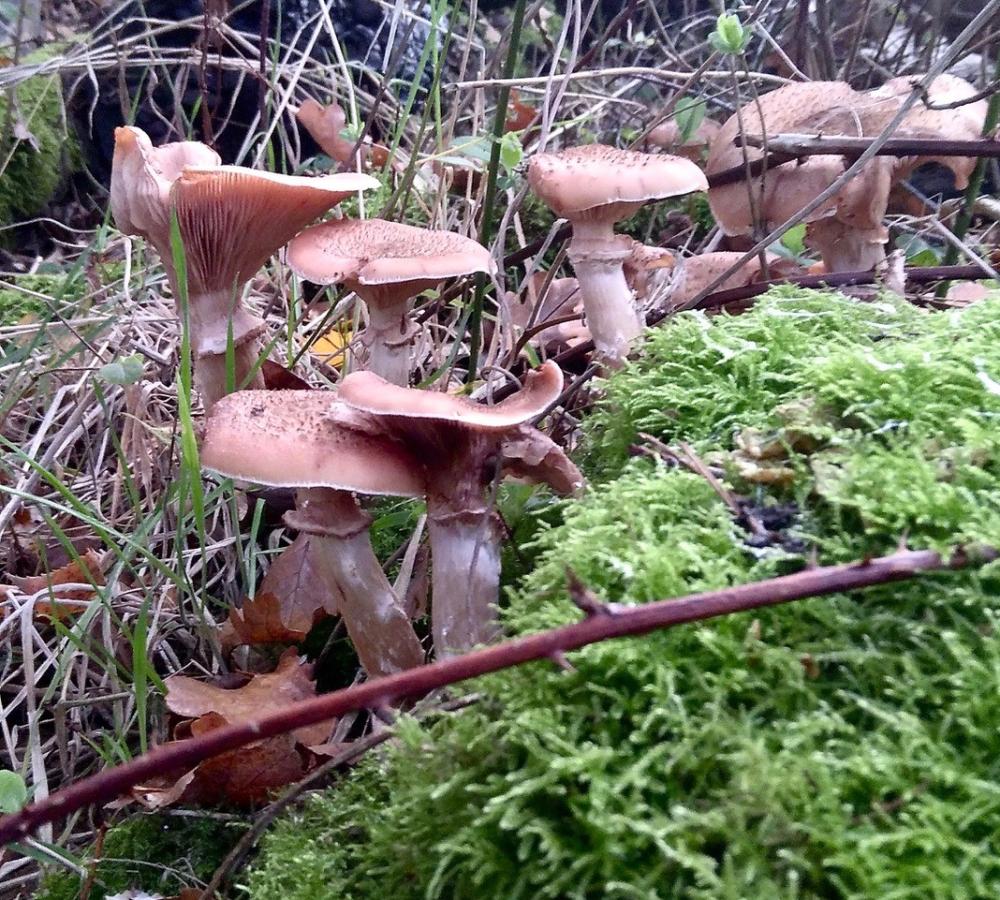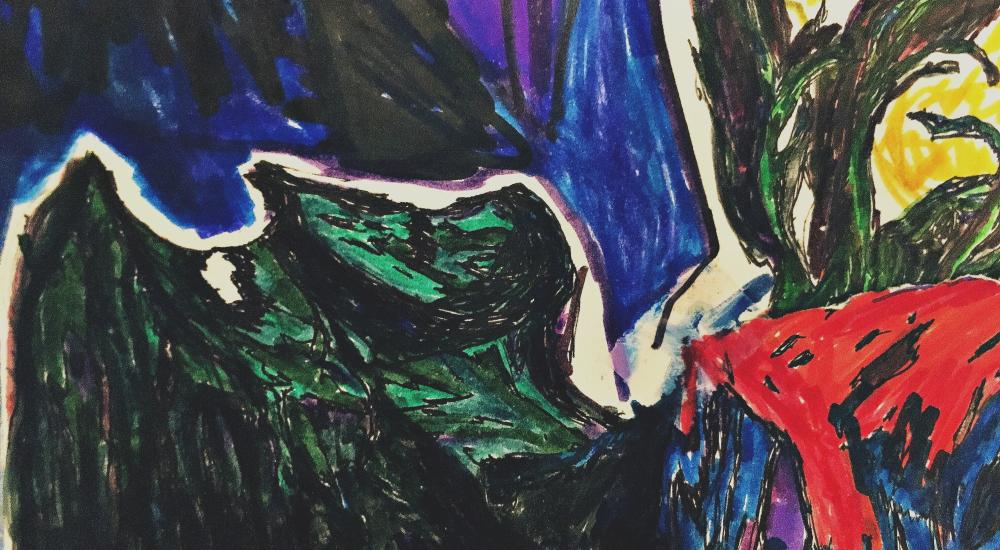The fungi paradigm: reframing theories of the origins of life on earth
A Series of More-Than-Human Encounters
We are sorry to say that Olave Nduwanje will exceptionally not be able to attend this evening. The event will therefore continue with an introduction by Goedele Nuyttens. Erika Sprey will lead the conversation with Camille Barton.
Des avancées technologiques récentes ont radicalement modifié (et accéléré) la vision de la science sur les fungi (champignons). De plus en plus de mycologues enthousiastes et de scientifiques aspirent à réécrire notre histoire scientifique occidentale sur l’origine de la vie de manière à rendre justice au rôle essentiel que jouent les champignons dans la vie sur notre planète. Les « règnes » dans lesquels cette vie est traditionnellement classifiée – végétaux, animaux, insectes et les virus – se révèlent profondément redevables au règne féminin des fungi et être interconnectés de manière cruciale avec celui-ci.
Au cours de cette soirée, nous découvrirons la multitude étourdissante de relations, d’opportunités et d’implications que les fungi représentent pour la vie sur notre planète et pour notre corpus limité/croissant de connaissances sur les fonctionnements complexes de la planète et de la vie qu’elle abrite. Pourquoi les fungi aident-ils les arbres et les végétaux à communiquer entre eux ? Ou à partager des ressources ? Les technologies inspirées des fungi constituent-elles l’avenir de l’inversion du changement climatique et le remède à la pollution environnementale ? Que peut nous apprendre la vie écosociale en réseau des fungi à propos des succès de la vie sur terre, à propos de l’apprentissage, de la résolution de problèmes, de l’interdépendance, de la créativité, de la sagesse, de l’intelligence et de la conscience de la vie non humaine ? Et sur la façon dont ceci s’harmonise avec la vie humaine ? Le réseau est-il la forme d’organisation la plus forte/efficace/adaptée/sage ? La psilocybine (substance active du champignon psilocybe) déverrouille-t-elle la conscience limitée de l’humain et de l’animal et leurs perspectives sur la vie, la connectivité et les relations ? La conscience des mammifères est-elle une conséquence de la prévalence de la psilocybine dans le monde naturel ?
20h00 – Introduction by Goedele Nuyttens
20h10 – Video-interview with Merlin Sheldrake, author of ‘Entangled Life’
20h30 – Lecture by Eveline Peeters, microbiologist at the VUB
20h50 – Interview between Erika Sprey and Camille Barton, artist and embodiment researcher
21h10 – Discussion and Q&A with the public
21h45 – End
• Camille Barton (il/elle) est un·e artiste interdisciplinaire, éducateur·rice et chercheur·se affranchi·e qui travaille sur les intersections de la personnification et la justice curative. Camille Barton dirige le programme temporaire de masters Écologies des Transformations (2021-2023) au Sandberg Institute, explorant de quelle manière la création artistique et l’incarnation peuvent faciliter le changement social. Il/elle complète en ce moment 18 mois de recherche sur le deuil avec le réseau mondial de l’environnement et crée un kit de rituels de deuil incarné pour soutenir le travail de solidarité écologique. Camille Barton est également conseiller·ère de l’association multidisciplinaire d’étude psychédéliques MAPS, assurant que des thérapies psychédéliques assistées soient accessibles aux communautés de couleur, les plus visées et les plus affectées par la guerre contre la drogue. En 2019, son projet a sous-tendu le Psychedelic Medicine and Cultural Trauma Workshop (atelier de médecine psychédélique et de traumatisme culturel), qui a précédé le premier programme de formation de psychothérapie MDMA pour psychothérapeutes de couleur. Camille Barton a écrit dans Vice, Talking Drugs, MAPS Bulletin et Double Blind à propos de politique sur la drogue et de justice raciale et donne internationalement des conférences sur ces thèmes.
• Merlin Sheldrake est un biologiste et écrivain avec une formation en sciences végétales, microbiologie, écologie et histoire et philosophie des sciences. Il détient un doctorat en écologie tropicale de l’Université de Cambridge pour ses travaux sur les réseaux fongiques souterrains dans les forêts tropicales du Panama. Il siège dans le Conseil consultatif de la Fungi Foundation (Fondation Fungi) et de la Society for the Protection of Underground Networks (société de protection des réseaux souterrains). Il est chercheur associé à l’Université libre à Amsterdam. Sa recherche couvre la biologie fongique, l’histoire de l’ethnobotanique amazonienne et la relation entre le son et la forme dans les systèmes résonnants. Brasseur et fermenteur passionné, Merlin Sheldrake est fasciné par la relation qui survient entre humains et organismes plus qu’humains. Il est en outre musicien et joue au piano et à l’accordéon.
• Olave Nduwanje est née au Burundi et s’identifie à une femme trans non binaire. Elle est une autrice publiée, juriste et activiste (antiracisme, droits des communautés LGBTQI+, anticapitalisme, droit des personnes en situation de handicap, antiécocide, etc.). Olave Nduwanje a fourni des contributions littéraires aux ouvrages suivants : Zwart-Afro-Europese literatuur uit de Lage Landen (2018 – littérature noire afro-européenne des Pays-Bas), De Goede Immigrant (2020 – le bon immigrant) et Being Imposed Upon (2020 – être celles à qui on en impose).
Recent technological advancements have drastically altered (and accelerated) contemporary scientific insights into fungi. More and more fungi enthusiasts and scientists are seeking to re-tell our western scientific story of the origins of life in a way that does justice to the crucial role fungi play In the life of our planet. The “kingdoms” – plant, animal, insect and viral – into which this life is traditionally classical divided, are revealed to be deeply indebted to the fungi “queendom”, and interconnected in critical ways by the underground world of fungi.
During this evening, we will uncover the dizzying multitude of relationships, opportunities and implications that fungi represent for life on our planet, and for our limited/growing body of knowledge on the intricate workings of the planet and the life it harbours. Why do fungi help trees and plants communicate to each other? Or share resources? Are fungi-based technologies the future for climate change reversal and remediation of environmental pollution? What can the networked eco-social life of fungi tell us about the successes of life on earth, about learning, problem-solving, inter-dependency, creativity, wisdom, intelligence and consciousness by non-human life. And about the way this meshes with human life? Is the network the strongest/fittest/wisest organizational formation? Do psylocibin mushrooms unlock the human animal’s limited consciousness and perspectives on life, connectivity and relation? Is consciousness amongst mammals a consequence of the prevalence of psylocibin in the natural world?
20:00 – Introduction by Olave Nduwanje
20:10 – Interview with Merlin Sheldrake by Olave Nduwanje
20:30 – Interview with Camille Barton by Olave Nduwanje
20:50 – Discussion between Camille Barton and Merlin Sheldrake
21:10 – Q&A with the audience
21/30 – End
• Camille Barton (they/them) is an interdisciplinary artist, educator and renegade researcher, working on the intersections of embodiment and healing justice. Camille is the head of Ecologies of Transformation (2021-2023), a temporary masters programme at Sandberg Institute, exploring how art-making and embodiment can facilitate social change. They are currently completing 18 months of research on grief with the global environments network, creating a toolkit of embodied grief rituals to support ecological solidarity work. Camille is also an advisor for MAPS, ensuring that psychedelic-assisted therapies will be accessible to communities of colour, most harmed by the war on drugs. In 2019, they project managed the Psychedelic Medicine and Cultural Trauma Workshop, a precursor to the first MDMA Psychotherapy training for therapists of colour. Camille has written for Vice, Talking Drugs, the MAPS Bulletin and Double Blind on drug policy & racial justice and speaks internationally on these topics.
• Merlin Sheldrake is a biologist and a writer with a background in plant sciences, microbiology, ecology, and the history and philosophy of science. He received a PhD in tropical ecology from Cambridge University for his work on underground fungal networks in tropical forests in Panama. He sits on the advisory boards of the Fungi Foundation and the Society for the Protection of Underground Networks, and is a research associate at the Vrije University, Amsterdam. Merlin’s research ranges from fungal biology, to the history of Amazonian ethnobotany, to the relationship between sound and form in resonant systems. A keen brewer and fermenter, he is fascinated by the relationships that arise between humans and more-than-human organisms. He is a musician and performs on the piano and accordion.
• Burundi-born Olave Nduwanje identifies as a non-binary trans femme (pronouns: she/her/hers). She is a published author, legal scholar, activist (anti-racism, LGBTQI+ rights, anti-capitalism, disability rights, anti-ecocide, etc.). Nduwanje has provided literary contributions to the following titles: Zwart-Afro-Europese literatuur uit de Lage Landen (2018), De Goede Immigrant (2020) and Being Imposed Upon (2020).
part of A Series of More-Than-Human Encounters, curated by Kaaitheater & Crosstalks in dialogue with Gosie Vervloessem, Olave Nduwanje, Mihnea Tanasescu & Marialena Marouda
€ 10 / 7 / 4
Due to technical problems, the live-stream has been canceled. A recording will be made available for those who bought a live-stream ticket.

